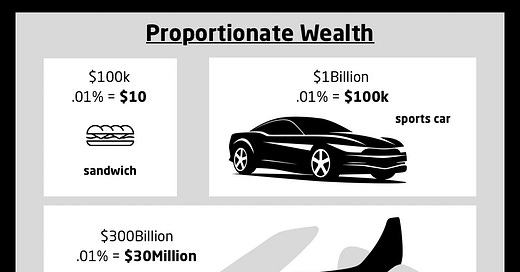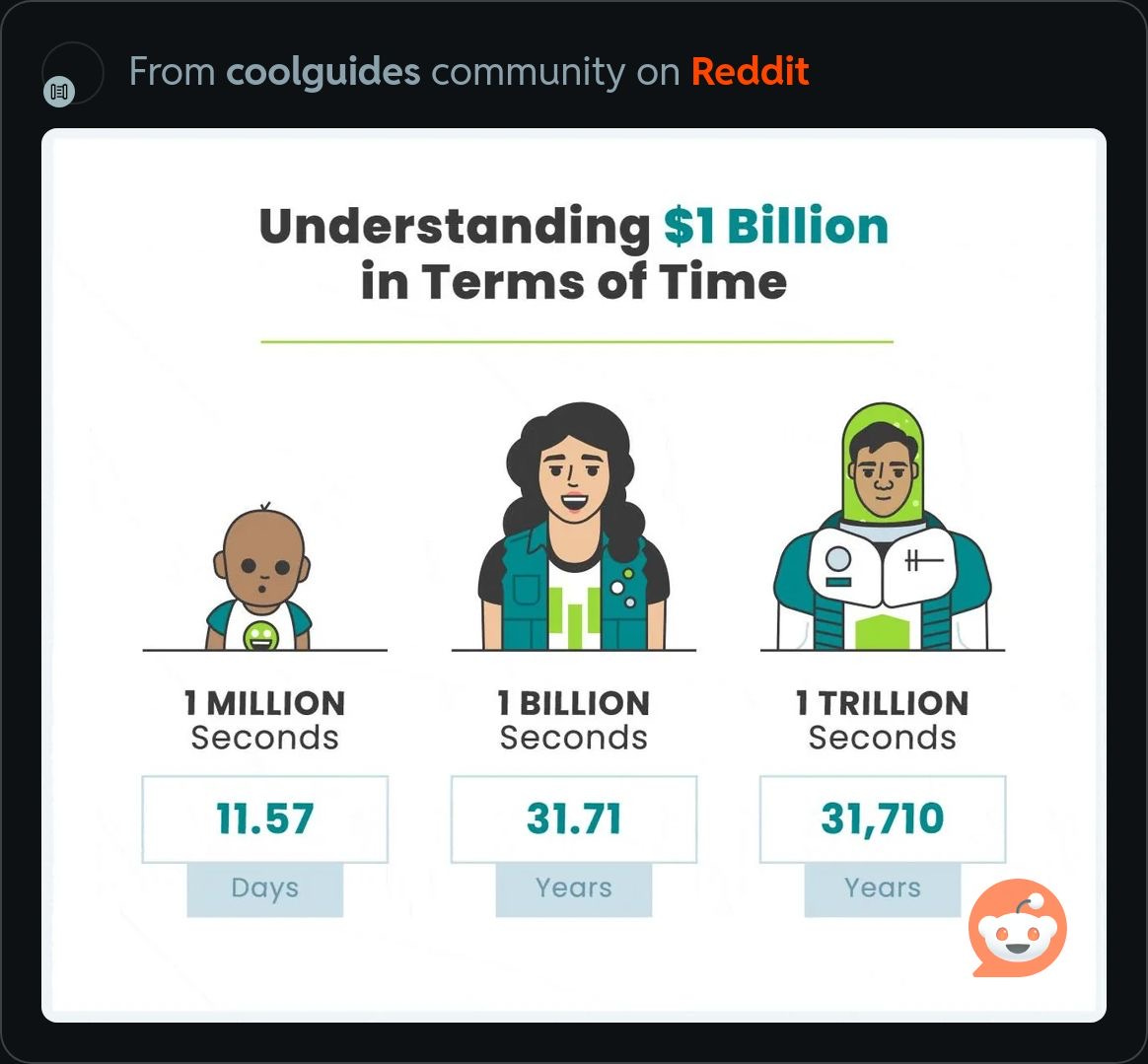Your $100 Is His $300 Million
Massive amounts of money are chump change when you’re a billionaire.
I recently learned that there are approximately 22 million millionaires in the US, thanks to The Opinionated Ogre. That’s only about 6.5% of the US population.
Chances are, according to the math, you’re not one of them.
But if you are, good for you! You probably know that $1mil might only buy you a medium-sized house in a high cost-of-living area, or it might get you through 20 years of retirement in a low cost-of-living area (assuming you never have any major medical expenses, don’t need assisted care, etc.). And yet, it’s an amount that 93.5% of people in the US have never seen and likely will never see. Just a mere million dollars.
For a while (and especially since a certain chainsaw-wielding someone started using his absurd wealth to advance the orange one’s campaign and his own agenda), I have been stewing about the wildly disproportionate power that extreme wealth provides. And now, we are seeing it in action.
So with that in mind, I invite you to join me on a little thought journey. How much wealth do these money hoarders actually have, how does it compare to the average American, and what does that mean for all of us?
UHNWIs, A.K.A. Money Hoarders
A “Centimillionaire” (insert Human Centipede joke here) is someone who controls at least $100 million, and usually more. I don’t know about you, but I cannot imagine how I would need that amount of money in my lifetime, but maybe that’s because I’m halfway through life already. Perhaps I’m missing out on something, like diamond-encrusting my refrigerator, or a yacht for each day of the week. (Imagine using your Tuesday yacht on Saturday. How gauche!) According to Barron’s, I’m missing out on golf and art collecting. Snooze.
But maybe I actually don’t get it because I’m not into using wealth to unduly influence elections and manipulate major social, political, and business systems to fortify my own power. Who’s to say?
Anyway! As of 2023, approximately 28,000 people in the entire world fall in the Human Centimillionaire category, which isn’t a lot of people. That’s only about half the enrollment of a large university like NYU or Arizona State, or half the population of a very small city, like Carson City, Nevada. More US residents die in auto accidents each year. Even on a slow day, there are more people at Disneyland.
Carson City, NV. Photo from traveltimenv.com
And around 10,000 of these uber-rich (“Ultra High Net Worth Individuals” - ew.) live in the US. We have a town-size group of people collectively in possession of at least $1trillion (and, realistically, a lot more, because of course they don’t each have only $100mil). How much even IS a trillion? It’s enough to buy every individual resident of Florida a brand new Porsche, and still have money leftover. It’s enough to buy the entire MLB, all 30 teams. It’s enough money to end world hunger.
But, you know, yachts.
But wait, there’s more! We haven’t even gotten to the UHNWIs with a billion dollars or more.
(Let’s call them that - UHNWIs! “Un-WEs.” Like, not-we? Not-us? …no? Sorry, I’ll get back to the point now)
Billions and Billions
In the US, there are a mere 800ish of these billionaire money hoarders. 800 people is slightly more people than my graduating high school class. You could fit the billionaires all on one airplane, the Airbus A380 (but of course, they would never stoop so low as to travel commercial) (also, probably shouldn’t put them all on one plane these days, you never know what might happen). It’s very, very few people. AND! Just the top 5 people together are worth that $1trillion that isn’t ending world hunger. (Hmm, would we say the five of them are worth not ending world hunger?)
In the US, an airplane-size group of people collectively hold a total of $6.22 trillion. That’s six world hungers. It’s 193 California state annual budgets (population 40 million people, BTW). But 800 people have it. In a given year, 30 times as many people will be murdered in the US. Morbid? Sure. But also, people die all the time because a few of these fuckers hoard the money, so this whole subject is pretty grim, isn’t it.
And look, I’m clearly not an economist, and I get that some of these people own massive businesses and have developed technology and employ lots of people and blah, blah, blah. But people do all of these things without being an UHNWI (ha, you’re pronouncing it that way in your head, aren’t you?!). There are tons of businesses that make our lives better that have regular-wealthy people at the helm.
Take Ulta, which makes my life better, even though it is definitely preventing me from saving my first $1million. The company employs 56,000 people and is publicly traded. The president and CEO, Kecia Steelman, is worth about $21million, and gets paid waaay too much annually. She is pretty fucking rich. I’m not anti-millionaire; go on with your bad self. But she is not an “UHNWI” and there is a big (literally exponential) difference.
And before some hustle bro comes at me with, “Stop being so negative and let it inspire you to work hard and build your wealth!” Yeah, no. I already bust my ass, and you probably do too. And I am all for building wealth. Have a million dollars. Have ten! But neither you nor I will ever be billionaires or anywhere close to it, and we don’t need to be. No one is “working hard” for billions of dollars, because it’s impossible to actually earn that kind of money. It comes from generational accumulation of wealth, or exploitation of those who are actually doing the hard work, and compounded interest on hoarded money.
Comprehending Copious Amounts of Cash
It’s pretty tough to conceptualize these massive amounts of money, and I just don’t think we peasants get it. I’m certainly not the first person to try to help us wrap our heads around it. A quick search will render previous explainers like this, in which the author frames $1billion in increments of $10,000 over time. At $10k a day (a pretty amazing salary) and saving every literal penny, you’d need 274 YEARS on Team NoDaysOff to accumulate your first billion dollars.
Here’s another way to think about the numbers:
(I know, it’s a lot of math, but you’re doing great! Don’t quit now!)
What’s It Like To Have A Billion Dollars To Spend?
So let’s now think about how someone might experience having $1billion or more. What does this unimaginable wealth do for you? How does it feel different from the normal human experience?
If you had $100,000, (which you maybe don’t, but I’m going to use it as a normalish amount of money) you could give $100 to one thousand people, right? So generous of you! But if instead you had $1billion to spend, you could actually give $1MILLION to each one of those thousand people. For your sad little $100k, you can buy ten thousand people a $10 sandwich. If we were to price those sandwiches proportionately to the billionaire’s wealth (one ten-thousandth), now they cost $100,000, or about as much as those Porsches we’re buying for the Floridians.
That is, in terms of proportionate wealth, sandwich is to normal human as fancy car is to billionaire.
You, average person, occasionally may buy a sandwich for a friend, a business client, or someone you’re trying to impress or influence. And hell, you’ll spend more if you really want to woo them. You’d take them to a nice-ish restaurant and spend maybe $100, or the equivalent of ten sandwiches.
Meanwhile, ten billionaire “sandwiches” is $1million. Cool, cool, cool.
And you-know-who, mister first buddy, is a billionaire 300+ times over. Are you following the proportional mathing? Because his “sandwich” equivalent is $30million, and his “nice dinner”equivalent is 300 MILLION DOLLARS. You’re taking your mom to Olive Garden, and he’s buying elections.
Remember when there was a not-at-all-unethical lottery where swing-state voters could win $1mil for signing a petition? (If you don’t, I understand, because eight gazillion worse things have happened since then. November feels like a different epoch.) It’s pretty easy to do that when it’s .0003% of what you have. One million dollars to the 300-Billionaire is like you rounding up for charity at check out: negligible.
Easy Peasy Sleazy
Alright. Take a deep breath. You’ve made it through the arithmetic portion of this adventure (whew!). Now ask yourself: if you could spend (the equivalent of) $100 or so to select your choice of candidate for president and get them to listen to you, to make sure all your government-funded business stays intact, to access every citizen’s government data, and to have control over a good portion of the entire government without having to bother with all of that election nonsense, might you spend it?
Would it feel hard to spend $100 for this amount of power? Would you be concerned about what the poor and slightly-less-poor people think and feel? Or maybe no, since, for the price of dinner, you can basically take over the country. And when the president wants more money for his evil political deeds, and he is willing to do a publicity stunt to boost one of your corporations, you can simply toss in a little bit more. After all, YOU probably know what’s best for 340 million people, even if they didn’t choose you. Or maybe not, but at least you know what’s best for you, and that’s to forego the P.F. Chang’s in lieu of a hostile government takeover! Ketamine kills the appetite anyway, so it’s not even hard.
I know, I know. You’re thinking your own ethics and morals would stop you from purchasing this bargain-bin power grab. Of course they would! Hopefully. Maybe. But anyway, you can surely understand why it’s tempting. It’s hard to pass up a good deal, even if it is a totally fascist one. And, as it turns out, not everyone has those pesky scruples. And really, who needs them? They would just get in the way. Can’t let a conscience ruin an inexpensive opportunity to control (what used to be) the free world.
Mine! Mine! Mine!
So when people say “billionaires shouldn’t exist,” this is why. Concentration of wealth is concentration of power (at least it is in our super fun system), and at this extreme it’s deplorable. The level of privilege granted to an infinitesimal group - .0002% of the US - while millions suffer is unjustifiable. Or as Melissa Corrigan recently wrote:
For someone to personally possess a billion dollars in cash and assets and for them to not be personally sponsoring hundreds of immigrants, getting them legal representation, loudly advocating for an end to this madness… it’s unconscionable to me. It further reiterates the belief that one cannot be a moral and ethical person and even become a billionaire, for what one must do to reach that goalpost is, by its very definition, unethical and immoral.





